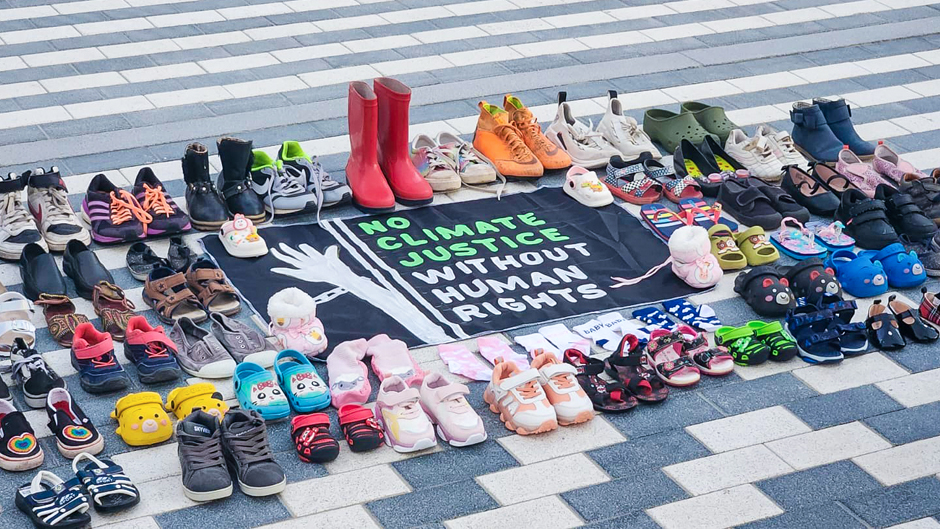The annual United Nations Climate Change Conference is underway in Dubai, with more than 70,000 participants—including heads of state, business leaders, climate scientists, Indigenous people, and others—coming together to find common ground in accelerating the transition away from planet-warming fossil fuels.
This year’s summit, known as COP28, is not without controversy. It is being held in the United Arab Emirates (UAE), the fifth largest oil producer in the world, and the president of the conference is Sultan Ahmed al-Jaber, who heads Abu Dhabi’s national oil company.
The talks also come as 2023 is expected to be the planet’s warmest year on record, leading many climatologists to warn that time is running out on preventing the Earth from reaching a tipping point.
Related stories:
Students, faculty at UN climate talks
What I am watching for at COP28
Panamanian island is being swallowed by the sea
A University of Miami delegation of students and faculty members is in the UAE for the historic conference, attending talks, participating on panels, and presenting their own climate-related research and clinical work. Keep abreast of their activities as they file regular dispatches from Dubai, giving readers a behind-the-scenes look at the two-week summit.
Dec. 12, 2023
Pushing history in the right direction
Megan Williams, student in the School of Law
I attended a recent COP28 panel on the judicial perspectives on climate litigation where we heard from various justices, ambassadors, professors, and directors.
Among those presenting was Christina Voigt, who is a professor of law at the University of Oslo, Norway, the chair of the IUCN World Commission on Environmental Law (WCEL), and the first co-chair of the Paris Climate Agreement’s Compliance and Implementation Committee. Serving as a legal adviser and negotiator for the government of Norway in the UN climate negotiations, Voigt is widely recognized in various topics of international environmental law.
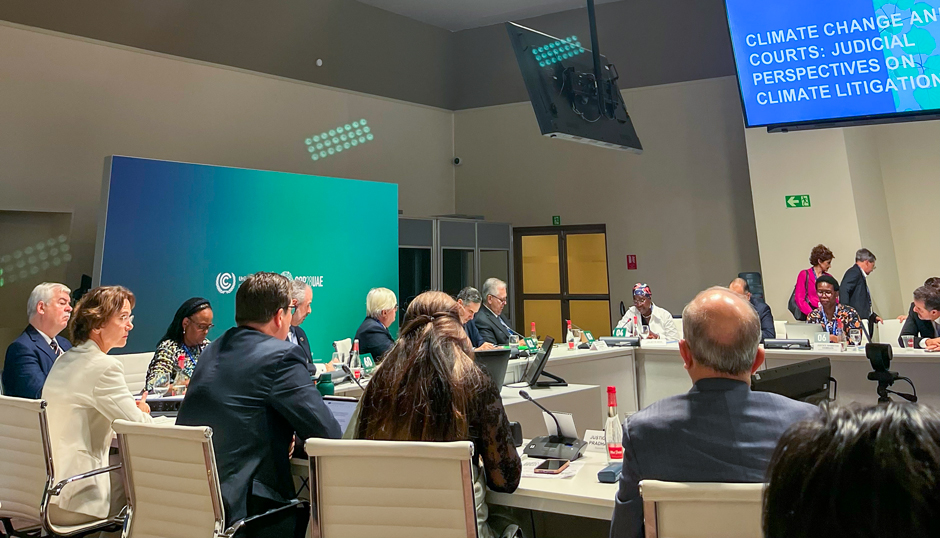
During the panel, Voigt discussed the importance of using international law to create a level playing field. She emphasized how international law can offer a just, fair, and effective response to a collective action problem that stretches over a long and temporal scope. Voigt explained that much of this language is in the UNFCCC and the Paris Climate Agreement; however, this is not a “silver bullet,” as international law is necessary to compliment these texts.
She gave examples in a non-exhaustive list of different treaties that would align with climate change texts, including the protection of human rights, protection of the marine environment, the Geneva Convention, unilateral trade measures, and investment protection. To push history in the right direction, Voigt emphasized the need for the effective implementation of this language and the crucial and indispensable role of the judiciary to uphold it.
Dec. 12, 2023
Aquatic foods can help address the climate crisis
Katie Geddes, Ph.D. student in the Abess Center for Ecosystem Science and Policy
On my first day at COP28, I connected with my partner organization, the UN Food and Agriculture Organization (FAO), at an event co-hosted by Somalia and FAO entitled, “Can fisheries be an option to address climate change?” The event was moderated by Abdulkadir Abdinor Yusuf, director general for the Somalia’s Ministry of Fisheries and Blue Economy. This event highlighted speakers from Somalia, The Gambia, Zimbabwe, FAO, and the African Development Bank.
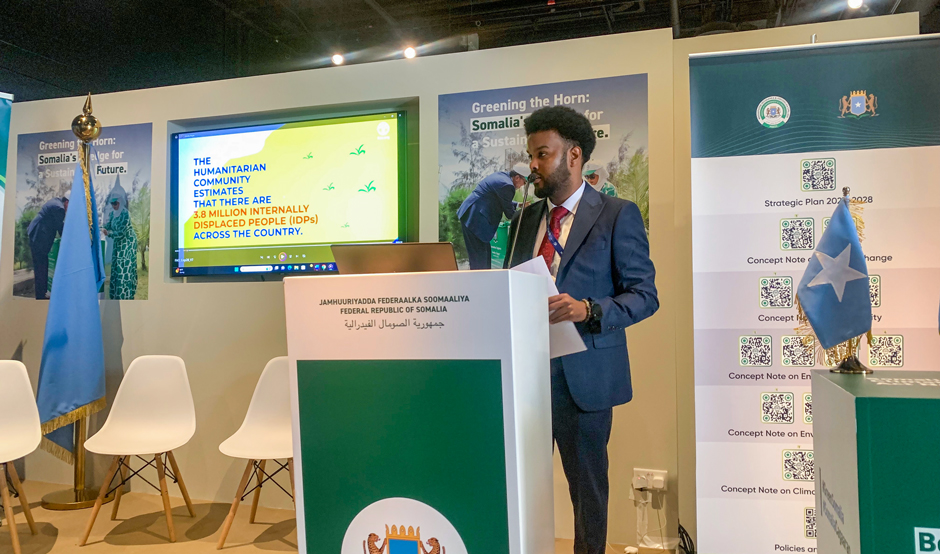
Focused on the linkages between climate change, sustainable fisheries, and food security, the event featured speakers who emphasized that we cannot fix the climate crisis without fixing world hunger. Manuel Barange, director of the Fisheries and Aquaculture Division at the Food and Agriculture Organization of the United Nations, stressed that there are currently 12 countries in the world where 90 percent of the people cannot afford a healthy diet, and by 2030 there will be at least 6 million people who are undernourished.
Aquatic foods can help address food insecurity and the climate crisis because seafood has a lower carbon footprint than other sources of protein such as beef and chicken. For example, 1.2 kilograms of fish feed yields 1 kilogram of fish, a much higher feed-to-flesh ratio than other meat products. The feed-to-flesh ratio of beef is roughly 6 kilograms to 1 kilogram. The main source of emissions from marine capture fisheries, fuel from fishing vessels, is significantly lower than the impacts of land-based industrial farming.
Somalia has a huge potential to expand marine capture fisheries as well as aquaculture given its impressive 3,333 kilometers of coastline—the largest in mainland Africa. This can be achieved through sustainable management of marine fisheries, new port infrastructure, capital for aquaculture technologies, and community engagement. Mobilization of climate finance toward these aims can serve as a powerful co-solution for food insecurity as well as climate change adaptation and mitigation.
Dec. 12, 2023
The importance of local communities and Indigenous peoples in climate resilience
Alexis Burns, student in the School of Law
Despite Indigenous peoples only making up 3 percent of the global population, they provide support for 80 percent of global biodiversity. At COP28, I partnered with Pollination Foundation, a collaborative organization that promotes community-led climate solutions. At Pollination, Indigenous knowledge is valued and woven into a systems-based approach, elevating community knowledge and inspiring us to reimagine and nurture our relationship with nature.
In following the Local Communities and Indigenous Peoples Platform (LCIPP) at COP28, Indigenous youth and knowledge holders called for direct access, not only to funding but to participation in negotiations. Indigenous peoples want a seat at the table, and they asked the United Nations to create more formal processes within the United Nations Framework Convention on Climate Change (UNFCCC) to engage Indigenous peoples more effectively.
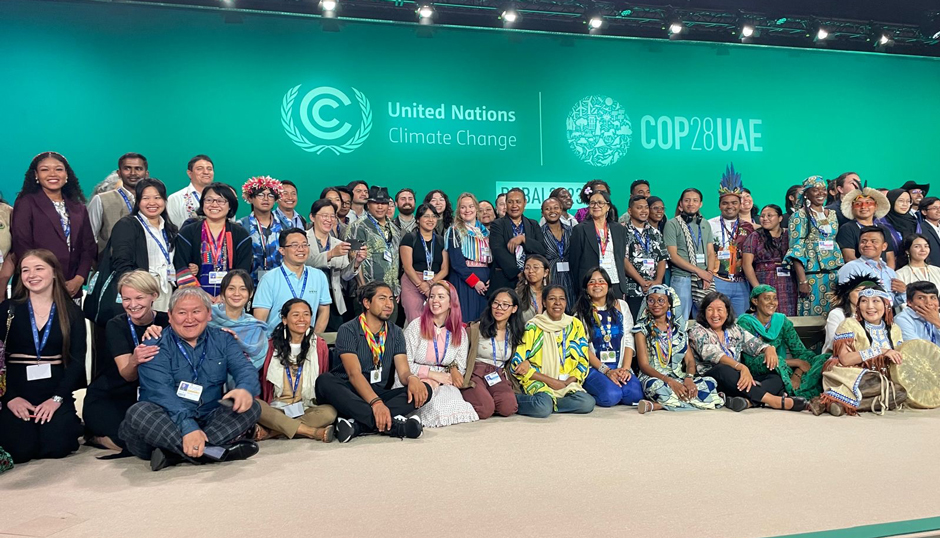
Local communities and Indigenous peoples have critical knowledge about the land and employ sustainable processes, and they are the ones on the frontlines of climate change impacts. Their knowledge is crucial to reach emissions goals; therefore, countries should include and incorporate local communities and Indigenous peoples in their planning. This involves inclusion in systemic data, such as national adaptation plans and nationally determined contributions. Therefore, the UN needs local communities and Indigenous peoples not only at the negotiations and decision-making tables, but actually driving and enforcing change.
A just and clean transition is only possible with the input of Indigenous peoples and their active participation throughout the entire process. Indigenous peoples’ human rights are not protected, and their land and lives are threatened because of climate change. They work to ensure that their livelihood does not disappear, and they do so in a way that supports their cultural identity and the environment. Public policy and funding must support this Indigenous work.
At a panel on First Nations contributions to climate change, Sam Murray, deputy CEO of the Indigenous Desert Alliance, stated, “Give us the space, support us, because we are looking after our country the right way.” Indigenous peoples hold the solutions to healing the environment, we just need to listen to their shared knowledge, learn from their practices, and implement them into our climate policies in an ethical and equitable way.
Dec. 12, 2023
Bringing future generations to the table to address climate change
Delaney Reynolds, student in the dual law degree and Ph.D. program at the Abess Center for Ecosystem Science and Policy
Week two of COP28 has been well underway, and there was tremendous excitement buzzing through the venue given the theme of a recent day session: “Youth, Children, Education, and Skills.”
This marks the second year that the United Nations has included future generations in the discussion about the most significant crisis that they will ever face. To kick off the session, Brenda Mallory, chair of the Council on Environmental Quality (CEQ), who I had the pleasure of meeting at the summit, announced the Biden-Harris administration’s new Ocean Justice Strategy to provide environmental justice aid to communities that rely upon the ocean and are the most vulnerable, but lack the resources to protect themselves.
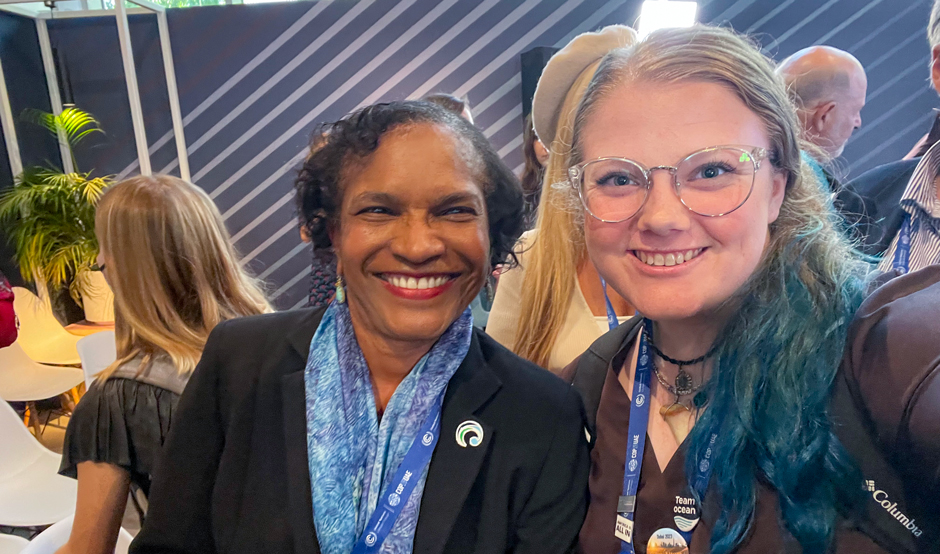
However, the outcome from last week’s COP28 negotiations is less than admirable. The first ever Global Stocktake continues to be a battleground. Nations cannot decide on whether the language should be to “phase out” (eliminate) or “phase down” (decrease) fossil fuel use, which is a contentious topic as we try to achieve the Paris Climate Agreement goal of limiting global warming to well below 2 degrees Celsius, and ideally no more than 1.5 degrees Celsius.
Additionally, the initial 24-page proposed draft was essentially scrapped, and a three-paragraph document was instead published requesting that the co-chairs on the matter reassess the views submitted by all parties to create a new agreement. This essentially means that our world leaders could not come to a decision on what may potentially be the most important agenda item to come out of this year’s COP.
Dec. 8, 2023
Team two arrives
Jessica Owley, professor of law and director of the Environmental Law Program
The second delegation from the University of Miami has arrived in Dubai for week two of COP28 and are quickly getting to work. Our students will be shadowing and supporting the Ecuador delegation. Shortly after arriving, they met with Walter Schuldt, director of environment and sustainable development affairs for Ecuador’s Ministry of Foreign Affairs, and his advisor, Veronica Arias.
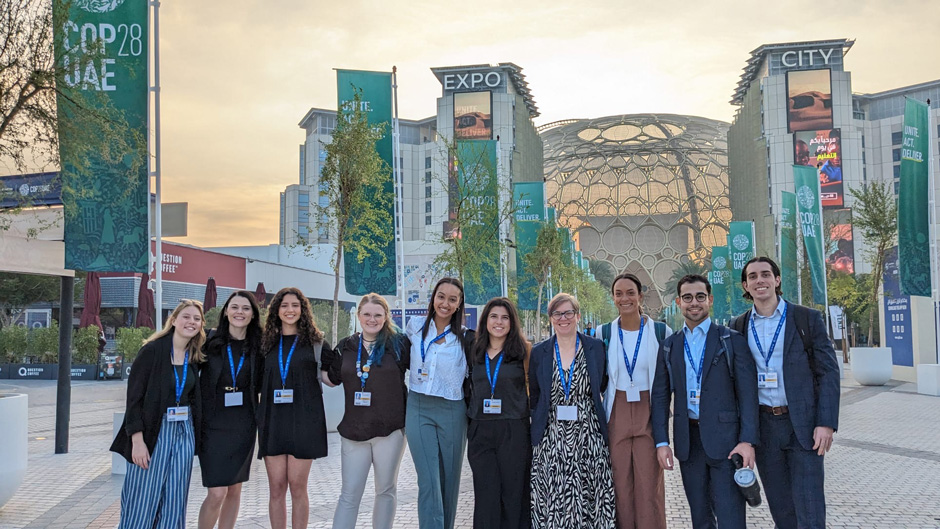
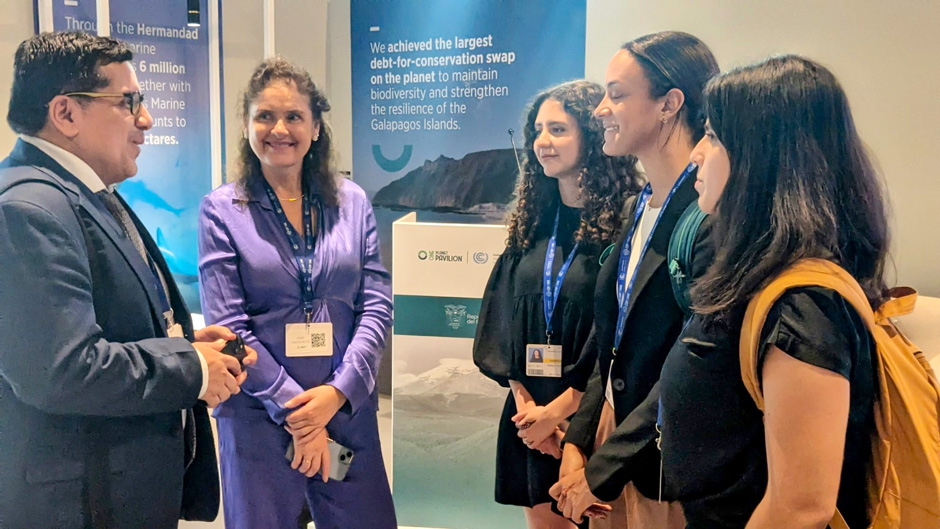
Dec. 7, 2023
Unfruitful negotiations over aviation and maritime fuel emissions
Jonathan Painter, School of Law student
I’ve been following a series of negotiations related to methodological issues on emissions from aviation and maritime fuel. The Subsidiary Body for Scientific and Technological Advice (SBSTA) receives reports from the International Maritime Organization and the International Civil Aviation Organization.
The methodological issues relate to the way international aviation and maritime transport emissions are counted under the various treaties. The sticking point in this negotiation has been in language summarizing the parties’ discussions. China wanted the summary text to indicate the parties have “divergent views.” Both Iraq and Saudi Arabia supported China’s objection. The original draft proposal acknowledged the “exchange of views.” The United States, United Kingdom, and several other countries supported the original draft language. At COP, decisions are made by consensus. While unanimous agreement is not necessary to reach consensus, objection prevents a consensus from being reached.
The disagreement over language has consumed this group over several days, with a decision being reached to allow for several hours of “informal-informal” meetings that were closed to observers.
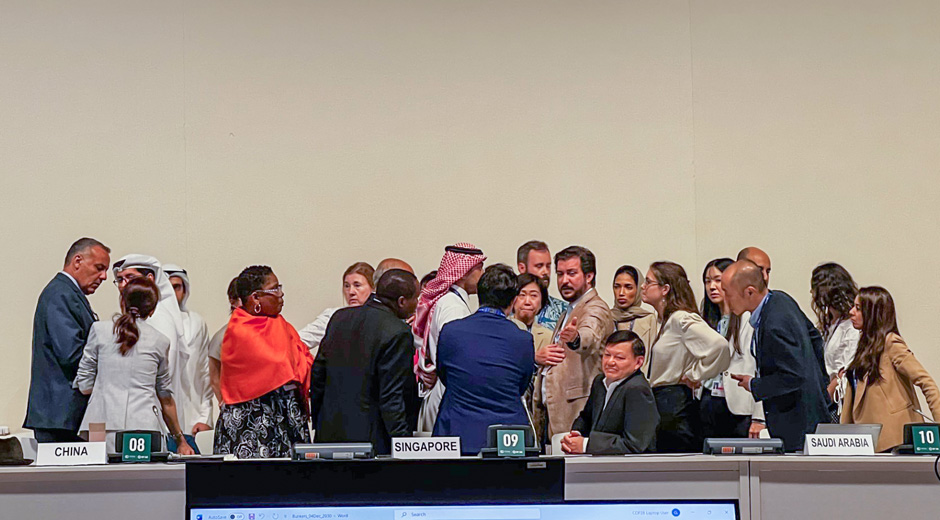
At the final informal meeting, when it was clear the parties had not arrived at a consensus, the co-facilitators proposed 40 minutes of direct conversation. Rather than formal conversation around the table, parties huddled in groups to propose various compromises. The meeting was extended for an additional hour. The parties tried to reach a compromise by omitting the disputed paragraph, but that compromise was met with objection. At one point, the co-facilitators asked if the negotiators could agree to simply adopt the language of paragraph 5, which said the parties “agreed to continue consideration of this matter” at the next meeting. Even that compromise was objected to.
During the huddles, a variety of language was proposed. Egypt offered “range of views” to Japan. Singapore offered “the common and divergent views of the parties” during one section of formal discussion.
After another hour of direct conversation, with the clock ticking down, the parties appeared to have reached “a way forward.”
A plenary was then scheduled, at which point the language of various subsidiary bodies’ negotiations would be presented. The plenary was delayed into the evening, but no email with draft language of the aviation and maritime fuel negotiations appeared. Alas, the way forward seemed to have been rejected. Four days of negotiation were unfruitful due to a dispute over a single word in the summary text.
Dec. 7, 2023
A troubling end to the global stocktake negotiations
Alyssa Huffman , School of Law student
Throughout my time at COP28, I have been following negotiations surrounding the global stocktake, which is a process for countries and stakeholders to see where they are collectively making progress towards meeting the goals of the Paris Climate Change Agreement—and where they’re not.
The global stocktake negotiations analyze that progress and set forth steps moving forward to increase efforts toward limiting global warming to 1.5 degrees Celsius based on technical reports submitted by each party. The reports are clear: We are not on track to meet the goals of the Paris Agreement by 2030.
At the negotiations, many issues, including how we will implement response measures to climate change and how we will finance a shift to green energy, were extremely contentious. The parties negotiated for this past week at the subsidiary body level, with a deadline to submit the negotiated text to the main Paris Agreement body (CMA) for further negotiations in week two.
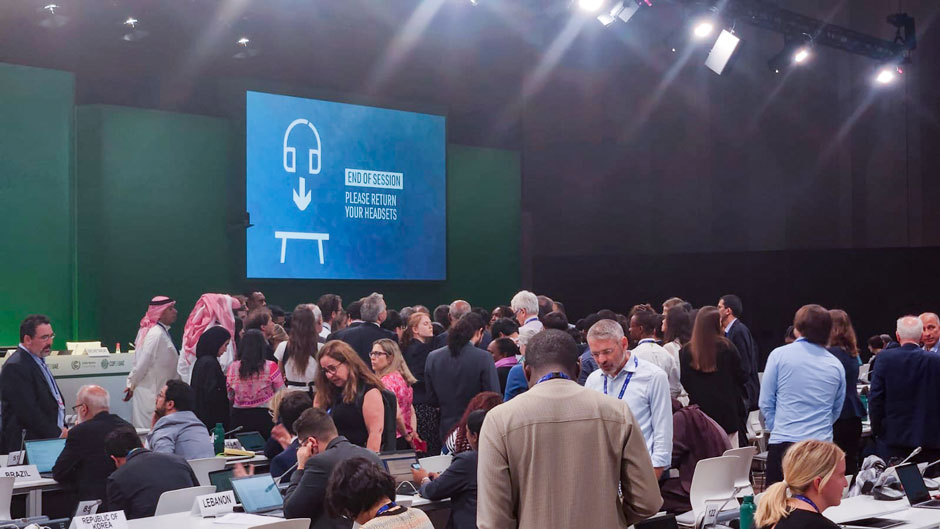
The final day of negotiations ended in an unexpected manner. While most of the parties expected the co-chairs to develop a third draft of the stocktake text, the chairs instead announced that because there were too many conflicting views expressed, they didn’t feel as though they could satisfactorily express all the views in a text that the parties would be comfortable submitting to the CMA. So, they would submit a “building blocks” draft text that did not incorporate any views expressed in the previous day of negotiations.
Upon announcing this, parties began voicing their concerns and objections, and the co-chairs briefly adjourned to discuss a path forward. The parties quickly convened into what is referred to as a “huddle.” They discussed how to push something into the main CMA negotiations that could be agreed upon and ultimately settled on sending the “building blocks” text along with a compilation of views expressed by parties in negotiations following the release of that text. The flexibility and informal nature of the text being sent on to CMA is concerning for how strong the final text will actually be, if they can even reach a final consensus.
Dec. 7, 2023
University of Miami organizes resilience event in the Ecuador Pavilion
Alyssa Huffman, School of Law student
I attended a panel event in the Ecuador Pavilion organized by the University of Miami on local resilience efforts. The panel, “Resilience Talks,” was a refreshing change from the typical lecture style of so many panels at COP28, in that it took the form of a conversation, with audience members arranging their chairs to surround the speakers for a more intimate discussion.
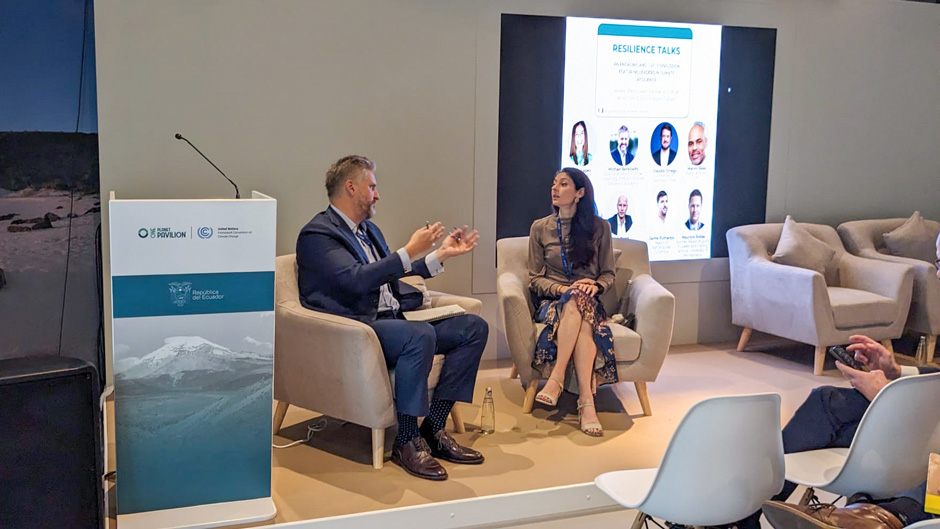
The panel addressed a multitude of topics such as sea level rise, flooding, and the way communities adapt to climate change. Speakers included local mayors, CEOs of resilience-focused nonprofits, and diplomats. I was impressed by the audience engagement, yet unsurprised at the same time, as resilience is something that everyone has an interest in, and community engagement drives local resilience efforts. Miami will turn its attention to the resilience of its own communities during Climate Week Miami at the end of April 2024.
Dec. 6, 2023
The plight of the people of Gardi Sugdup
Daniel Suman, professor in the Rosenstiel School of Marine, Atmospheric, and Earth Science
Today, I joined Oregon State University researcher Ana Spalding, an alumna of the Rosenstiel School of Marine, Atmospheric, and Earth Science, in giving a presentation at the COP28 Panama Pavilion on our work documenting the plight of more than one thousand residents of Gardi Sugdup, a small island off the Caribbean coast of Panama. The island is disappearing as a result of climate-change-induced sea level rise, and soon, the residents will be relocated to the Panamanian mainland. Read about our research in News@theU.
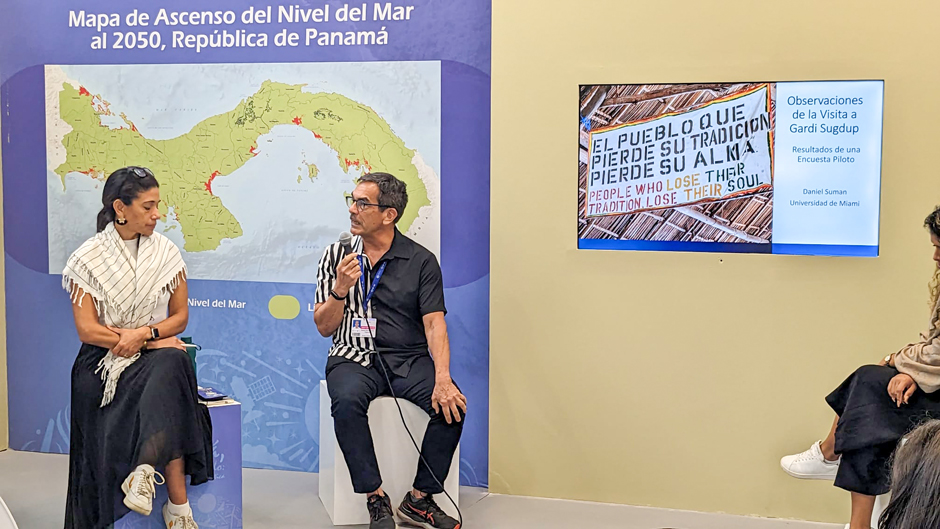
Dec. 6, 2023
How funding is used to take action against climate change
By Delaney Reynolds, student in the dual law degree and Ph.D. program at the Abess Center for Ecosystem Science and Policy
The United Nations Climate Change Conference, or COP27, which was held last year Egypt, was the final year of the Global Environment Facility’s (GEF) seventh, four-year funding period, meaning this year at COP28 is the beginning of GEF-8. At the start of this period, 29 countries collectively pledged $5.3 billion, which is an exciting 30 percent increase from GEF-7.
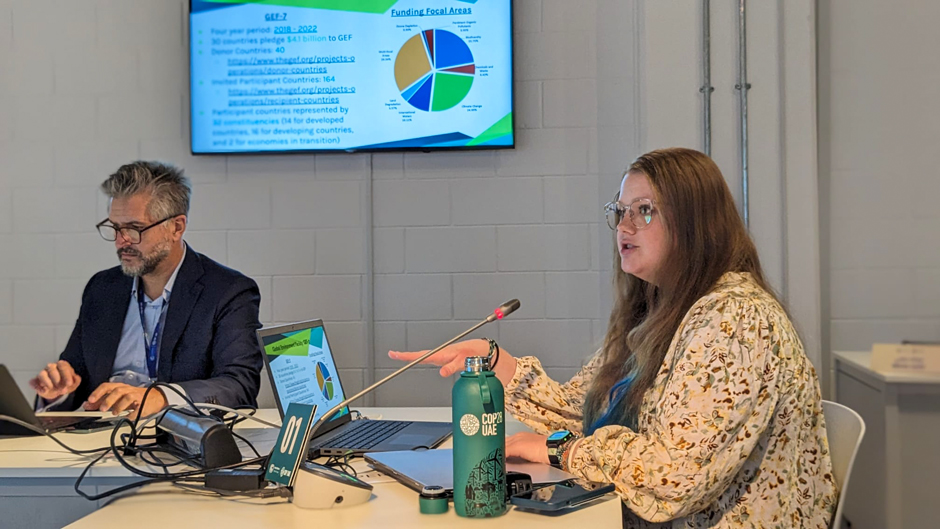
It was my honor to give a presentation to the University of Miami COP28 delegation on GEF financing. GEF provides developing countries the funds needed to support large-scale initiatives aimed at addressing biodiversity and forest loss, improving ocean health, combating pollution, and reducing the effects of climate change. Additionally, this year at COP28, GEF and the United Nations Industrial Development Organization announced a program that will develop a learning strategy and foster knowledge sharing from previous successful investments and projects. This will likely gain monetary support from the private sector that will be used to fund other initiatives in developing countries.
Dec. 6, 2023
The importance of port resilience
Jonathan Painter, School of Law student
Our first reading for the Climate Change Law and Policy class at the School of Law explained that the major uncertainty surrounding climate change isn’t the science, it’s the public reaction to the science. That assignment jumped back into mind as I watched a COP28 panel session on port resilience. The panel included representatives of DP World, CMA CGN (a French shipping and logistics company), and the Maritime and Port Authority of Singapore (MPA Singapore). The conversation was not in the future tense. Two large shipping companies and the busiest port in the world in shipping tonnage are experiencing the impacts of climate change today.
2023 is on track to be the hottest year on record, and both shipping companies described losses due to climate change. Shipping through the Panama Canal was delayed due to unusual drought conditions, shipments were lost in extreme storms in the North Atlantic, and heat waves meant turning down shipments of medicine because it would spoil in transit. MPA Singapore is building their Tuas mega port with an operational platform 5 meters above mean sea level. That type of futureproofing comes at considerable financial cost.
One of the panelists pointed out that port resilience is a larger problem than the port. Resilience also includes the supply chain, because if the trucks and trains can’t reach the port, it doesn’t matter if the port is operational. We experienced this exact scenario in South Florida last April. An extreme rain event interrupted access to Port Everglades, and we experienced a fuel shortage. As temperatures warm, we’ll continue to experience supply interruptions caused by climate change, which is why it’s so important to begin upgrading port infrastructure now.
Dec. 5, 2023
Urban Nature Program Launches at COP28
Jonathan Painter, School of Law student
At COP28, each University of Miami student is partnered with an organization concerned about climate change. My partner is the Miami-Dade County Office of Resilience. Consequentially, I’ve spent a lot of time in meetings and panels related to city resilience. One thing that’s struck me about resilience is that all our problems rhyme. Each city’s situation may be unique, and the instruments we use to reach a solution might be quite different. But we’re all facing similar challenges.
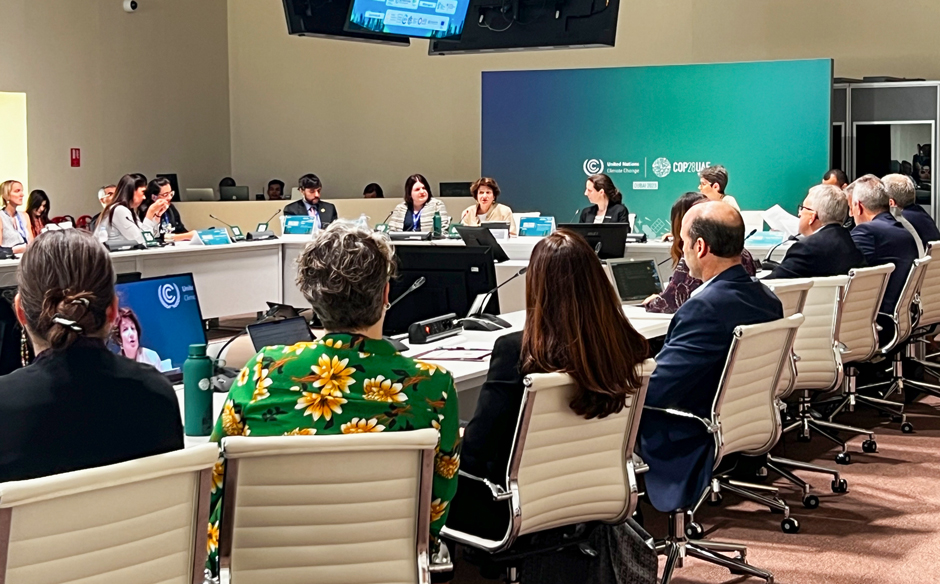
So, I was excited to attend the launch of the Urban Nature Program. The program, led by the World Bank, seeks to “provide financial and technical assistance to accelerate investments in nature in urban areas.” One of the keys to dealing with increasing heat in cities is green space. Planting trees in areas that lack green space provides a cost-effective way to reduce the heat-island effect and keep residents cooler. Several of the program’s “lighthouse cities” presented at the announcement.
One of the common threads was connecting heat resilience projects to direct benefit. For example, Freetown planted trees and created a youth jobs program to caretake for the city’s trees. They expect to plant their millionth tree this year and are expanding the program to five million trees in the next decade. While arboreal jobs might not motivate South Floridians, another mayor referenced a London study that determined transitioning a street from treeless to tree-lined can lead to an increase in home values. That should interest everyone in the Miami-Dade area.
Dec. 4, 2023
Ensuring equity in nature-based solutions to climate change
Vanessa Forbes-Pateman, Ph.D. candidate in the Abess Center for Ecosystem Science and Policy
When University of Miami professor Daniel Suman, who is attending COP28 as a member of the Panama delegation, invited me and other members of my team to present our research on nature-based solutions to sea level rise, I could not have been more ecstatic. It was an invaluable opportunity to discuss my work on how Miami seeks to operationalize nature-based solutions to sea level rise through its policy landscape.
My presentation could not have been timelier, as nature-based strategies are being presented as the next big solution to the complex challenges of climate change, whether it be king tides, powerful hurricanes, or daytime flooding. It is timely, considering that a huge part of COP28 negotiations on climate finance include technology transfer for mitigation, adaptation, and resilience.
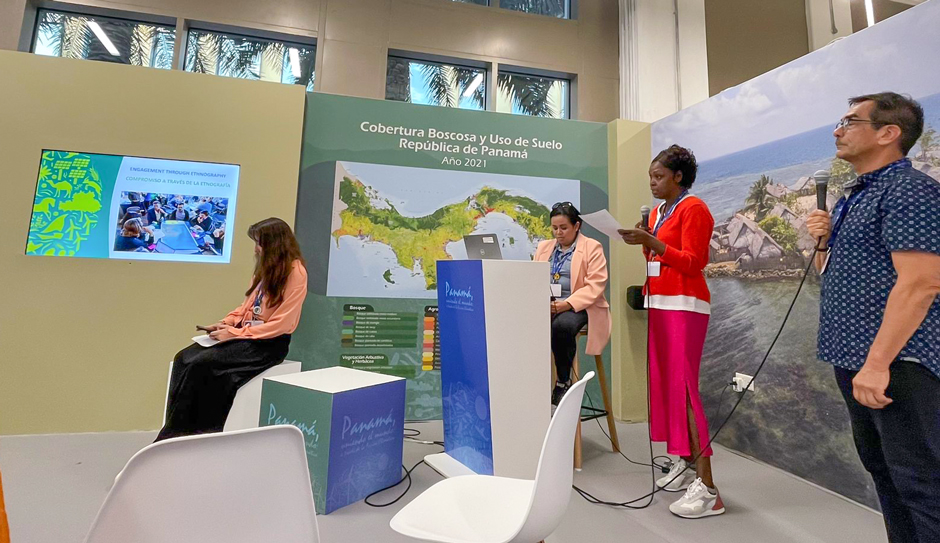
However, urban renovations such as the ones South Florida seeks to implement are new to the U.S. They have been more readily implemented in the European Union.
For Florida, the ability to use nature-based interventions rests with how policies are framed. The state faces policy problems stemming from a lack of policy cohesion. One of the big challenges we’ve seen addressed throughout COP28 is that of greening the economy in a way that is as fair and inclusive as possible to everyone. So, my research critically analyzes whether South Florida is including equity in its nature-based policies.
During my presentation at the COP28 Panama Pavilion, I reviewed several of the new and developing nature-based solutions to climate change that are in Florida’s arsenal. I also explained the contradictory nature of its legal, regulatory, and policy landscape, and how those contradictions might affect traditionally underserved communities that face climate challenges.
My research in this area affords me the opportunity to study and watch these issues play out across several levels within different communities.
Dec. 4, 2023
Nature-based solutions to sea level rise
By Alyssa Huffman, School of Law student
Today, my colleagues and I gave a presentation on nature-based solutions to sea level rise at the Panama Pavilion at COP28. I specifically focused on stormwater resilience and the potential for green infrastructure to alleviate pressure on existing stormwater infrastructure as sea level rise exacerbates flooding in Miami. My discussion stemmed from my work as a legal intern with the University of Miami School of Law’s Environmental Justice Clinic. The clinic focuses on local environmental justice advocacy throughout Miami and is made up of teams that address various issues such as housing justice, food justice, heat, and stormwater.
I am part of the stormwater team. We tackle the issue of stormwater pollution in Miami with a coalition consisting of the Environmental Justice Clinic, Miami Waterkeeper, Everglades Law Center, and PEER Group. The coalition aims to ensure compliance with federal regulatory stormwater permitting requirements by educating officials about requirements, engaging communities in governance, and, when necessary, litigating against those not in compliance.
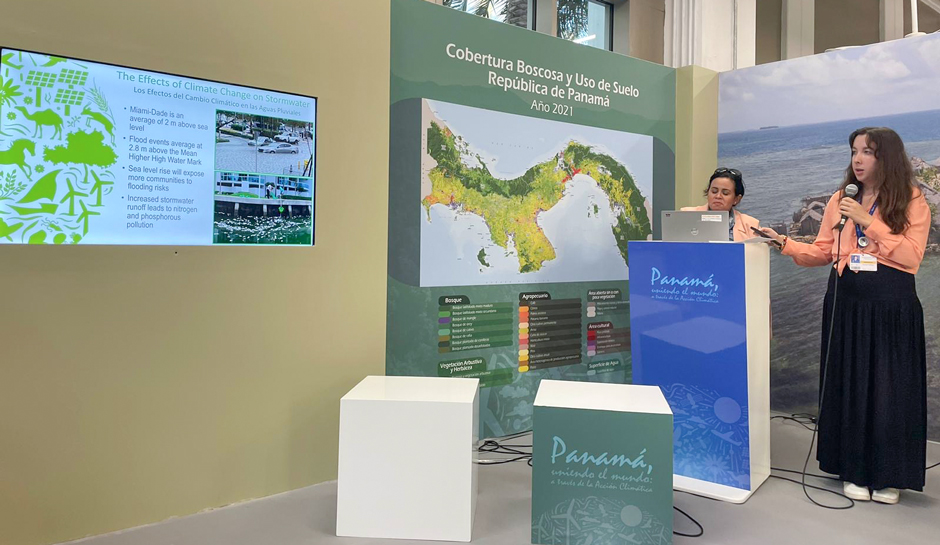
The movement towards green infrastructure is an important prong in the fight against stormwater pollution. It provides communities with enhanced resilience as we adapt to our changing climate. We must ensure that green infrastructure is implemented in an equitable manner that considers the voices and thoughts of the communities most impacted by stormwater. As such, my talk at the Panama Pavilion focused on how we can ensure a just stormwater infrastructure transition. I also highlighted some of the accomplishments of the Environmental Justice Clinic.
Dec. 3, 2023
Protesters brave extreme heat to make their voices heard
Vanessa Forbes-Pateman, Ph.D. candidate in the Abess Center for Ecosystem Science and Policy
There is a certain irony in having COP28 in Dubai, where we are experiencing extreme heat every day. But what is more concerning is that conference support staff, alongside regular workers in Dubai, continue to labor overtime in the heat. Today, we received word that anyone protesting in support of any cause should not do so during midday hours due to the excessive heat. While the advisory seemed to be issued for the well-being of protestors, I feel that, more than likely, the heat warning was a way to suppress any form of dissent, such as the demonstration I witnessed only a short distance from the UAE pavilion.
Dec. 3, 2023
COP28 leads to historic local partnerships
Alyssa Huffman, School of Law student
Michael Berkowitz, executive director of the University of Miami’s Climate Resilience Academy, is not attending COP28 solely for the negotiations. He also is focused on the connections he can make while attending outside networking events and panels. Indeed, COP provides a unique opportunity for climate leaders from across the world to convene and connect on a common goal. Michael invited me to attend a reception for the creation of a historic partnership: The Mediterranean Climate Action Partnership.
This initiative, headed by governments in Catalonia and California, brings together 14 local governments from several different continents that share similar climates to collaborate on local climate resilience efforts.
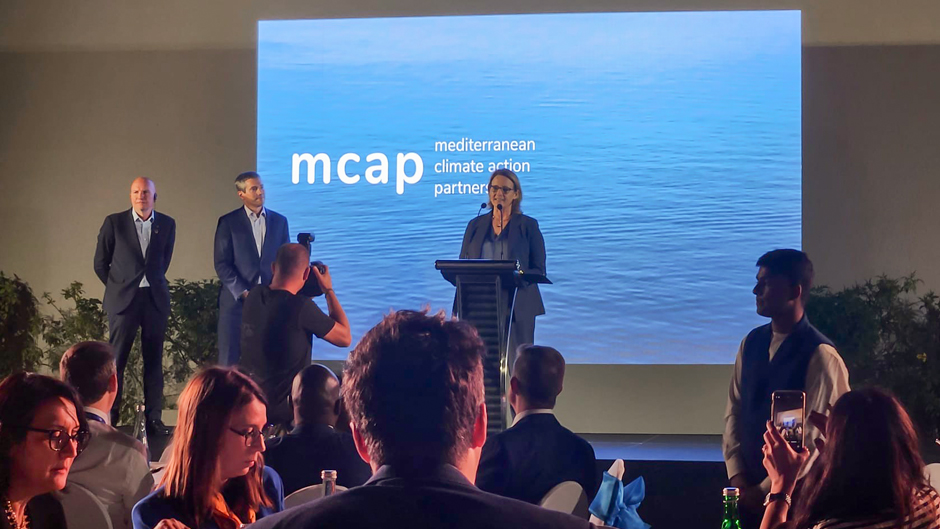
Deanne Criswell, who is the 12th administrator of the Federal Emergency Management Agency, spoke about the importance of local and subnational efforts in fighting climate change. So, while international negotiations continue at Expo City, local governments also are making waves throughout Dubai.
Dec. 1, 2023
Human rights and climate justice underscore COP28 climate negotiations
Alyssa Huffman, School of Law student
On the same day that a historic agreement was reached on the Global Loss and Damage Fund, a different kind of event was happening mere buildings away from where the historic pledge was crafted. I stood amongst a large crowd listening to Indigenous speakers call for a phase out of fossil fuels and a spot at the table for the Global South’s voice to be heard.
The purpose of the COP is not only to negotiate agreements under the UNFCCC (United Nations Framework Convention on Climate Change); in fact, that’s only a small portion of the vast number of events going on throughout this conference. This year, Indigenous and underrepresented groups are making their voices heard by hosting pavilions, staging climate-related art exhibitions, and weighing in on the ongoing negotiations. More than ever, there is a recognition that human rights and equity are needed to reach climate justice.
